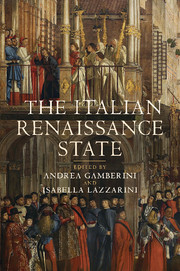Book contents
- Frontmatter
- Contents
- Notes on the contributors
- Note on translations and usage
- Map
- Introduction
- Part I The Italian states
- Part II Themes and perspectives
- 12 The collapse of city-states and the role of urban centres in the new political geography of Renaissance Italy
- 13 The rural communities
- 14 Lordships, fiefs and ‘small states’
- 15 Factions and parties: problems and perspectives
- 16 States, orders and social distinction
- 17 Women and the state
- 18 Offices and officials
- 19 Public written records
- 20 The language of politics and the process of state-building: approaches and interpretations
- 21 Renaissance diplomacy
- 22 Regional states and economic development
- 23 The papacy and the Italian states
- 24 Justice
- Bibliography
- Index
17 - Women and the state
Published online by Cambridge University Press: 05 August 2012
- Frontmatter
- Contents
- Notes on the contributors
- Note on translations and usage
- Map
- Introduction
- Part I The Italian states
- Part II Themes and perspectives
- 12 The collapse of city-states and the role of urban centres in the new political geography of Renaissance Italy
- 13 The rural communities
- 14 Lordships, fiefs and ‘small states’
- 15 Factions and parties: problems and perspectives
- 16 States, orders and social distinction
- 17 Women and the state
- 18 Offices and officials
- 19 Public written records
- 20 The language of politics and the process of state-building: approaches and interpretations
- 21 Renaissance diplomacy
- 22 Regional states and economic development
- 23 The papacy and the Italian states
- 24 Justice
- Bibliography
- Index
Summary
Introduction
‘Feminism does not have a theory of the state’, wrote Catharine MacKinnon in 1989, and the claim has been repeated more recently. Is this perhaps why, despite a traceable tradition of feminist interest in the state, ‘women’ and ‘the state’ are terms not often seen together in historical writing? Historiography on the state remains, in Italy as elsewhere, a privileged ground to observe how a persistent lack of interest in the history of women can indeed become a form of blindness. Yet one just needs to subsume women under ‘family’ or dilute the state into ‘politics’ to come to two objects of study that sound compatible enough. If the resulting wider picture is considered, then the historiography on late medieval and early modern Italy seems to offer a partial exception to the traditional gender-blindness of institutional history. The history of the state – even while being contested – has long been the via regia in the Italian context and historians interested in women and gender have found themselves addressing the issue of the state in a remarkably explicit way over the past thirty years. In fact, there might well be something about late medieval Italian states that made women's issues, if not women themselves, unavoidable for historians.
The binomial ‘women and the state’ presents problems of its own (including the viability of its two components, a singular ‘state’ and an all-encompassing ‘women’) but, perhaps more than ‘the family and the state’, has the advantage of questioning past and present assumptions about the interplay between ‘the private’ and ‘the public’, and offering a different perspective on the famous monopoly of violence, on the state's duties of protection and justice, and on legitimacy, discipline and institutions, three elements that have been indicated as the ‘necessary conditions’ of state-building.
- Type
- Chapter
- Information
- The Italian Renaissance State , pp. 345 - 367Publisher: Cambridge University PressPrint publication year: 2012



